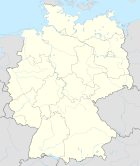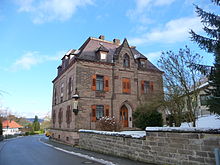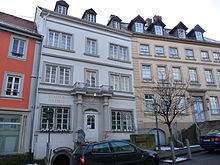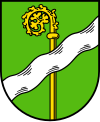Kusel
| coat of arms | Germany map | |
|---|---|---|

|
Coordinates: 49 ° 32 ' N , 7 ° 24' E |
|
| Basic data | ||
| State : | Rhineland-Palatinate | |
| County : | Kusel | |
| Association municipality : | Kusel-Altenglan | |
| Height : | 239 m above sea level NHN | |
| Area : | 14.37 km 2 | |
| Residents: | 5518 (Dec. 31, 2019) | |
| Population density : | 384 inhabitants per km 2 | |
| Postal code : | 66869 | |
| Area code : | 06381 | |
| License plate : | KUS | |
| Community key : | 07 3 36 055 | |
| City structure: | 3 districts | |
| Association administration address: | Marktplatz 1 66869 Kusel |
|
| Website : | ||
| City Mayor : | Jochen Hartloff ( SPD ) | |
| Location of the city of Kusel in the district of Kusel | ||
Kusel , written Cusel until 1865 , is the district town of the Kusel district and the administrative seat of the Kusel-Altenglan community . Kusel is located on the Kuselbach in the southwest of Rhineland-Palatinate in the North Palatinate Bergland . With 5405 inhabitants, Kusel is the second smallest district town in Germany. According to state planning, Kusel is designated as a medium-sized center.
geography
location
The small town of Kusel is located in the Saar-Nahe Hills belonging North Palatine Uplands . The region is often referred to as Musikantenland . Kusel is mainly divided into the core town around the historic old town, the district of Diedelkopf , which has meanwhile merged with the core area, and the residential area "Am Holler", as well as the district of Bledesbach . Neighboring communities are - clockwise - Blaubach , Altenglan , Rammelsbach , Haschbach am Remigiusberg , Schellweiler , Ehweiler , Pfeffelbach , Ruthweiler and Körborn .
Waters
The Kuselbach flows through the city in a west-east direction , which is created in the west of the district by the confluence of the Pfeffelbach and Bledesbach .
climate
The annual precipitation is 863 mm. The precipitation is in the upper third of the values recorded in Germany. Lower values are registered at 74% of the measuring stations of the German Weather Service . The driest month is April, with the most rainfall in December. The amount of precipitation in December is 1.8 times that of April. The rainfall varies moderately. Lower seasonal fluctuations are recorded at 50% of the measuring stations .
history
Development up to the Middle Ages
Celts and Romans once lived in the Kusel area.
Through the battle of Zülpich in 496 , Kusel came under Frankish rule and became part of the empire around Kaiserslautern through purchase or donation . In the 7th century, a Franconian royal court was built on the ruins of a Roman estate , which was used as a place to eat, the "Curtis Cosla". In 850 this farm is mentioned for the first time in a document .
In the 9th century, the farm and the surrounding land were owned by the Archdiocese of Reims , whose founder was Remigius . The royal court was transformed into a monastery courtyard by monks who organized it, and so it became the center of ecclesiastical and economic interests in the so-called Remigiusland . In 902 the Archbishop Heriveus of Reims consecrated the Remigius Church on today's market square as the first mother church in the entire area. In 931 the Hof zu Kusel and the surrounding area were handed over to the Abbey of St. Remy in Reims . On the nearby Remigiusberg , Reims monks built the Benedictine provosty in 1127, which now became the ecclesiastical center of the country. The court at Kusel became the seat of the administration through the representation of a court schoolmaster .
The Counts of Veldenz (1127–1444) became the country's guardians . Around 1214, Lichtenberg Castle was built nearby, which is known today as the largest castle ruin in Germany (425 m long, 382 m above sea level). Kusel was first mentioned in 1387 in a document from Count von Veldenz as "Cuddling the Stat". The fortification with moats, walls, towers and gates began. In 1444, Kusel was transferred to Zweibrücken , as the Veldenz count line ended. Lichtenberg Castle became the Oberamt Lichtenberg.
Early modern age
In the 16th century, the Kuseler Land suffered from the plague three times . In 1635 Kusel was burned down by Croatian troops in the Thirty Years' War . The city was rebuilt in 40 years, but most of it burned down again in 1677 by the troops of Louis XIV in the Palatinate War of Succession .
Kusel gradually developed into a town of craftsmen and drapers . French revolutionary troops occupied the place on July 26, 1794 . Kusel had to be evacuated within an hour on pain of death. After the houses had been looted, Kusel was burned to the ground for the third time. Only six houses remained. This act was considered a punishment, because the city had provided some citizens who had been held hostage in Metz with money that turned out to be falsified and was allegedly made in Kusel. One hypothesis about the burning down is that the parish Kasel was supposed to be destroyed, but there was a spelling mistake when issuing the orders.
Since the 19th century
In 1798 Kusel came to the Département de la Sarre . At the Congress of Vienna , the Palatinate on the left bank of the Rhine fell to Austria in 1815 and to the Kingdom of Bavaria in 1816 on the basis of an exchange contract . Kusel became the seat of a land commissioner in the Bavarian Rhine district . The first aqueduct was built in 1824. The Maximilian Fountain was created through voluntary donations. In the years from 1850 to 1880 important cloth and carded yarn factories were founded (customs officers, Ehrenspeck, Fickeissen). In 1865 the name Cusel was officially changed to Kusel . In 1868 the railway line from Landstuhl to Kusel was built, which brought the city great economic advantages. Kuselite , which was used as a paving stone and to route railway lines, was quarried in the surrounding quarries . Breweries, machine foundries, wool weaving mills, brickworks, printing works, and chain and nail smithies also sprung up. The large cattle markets (later the Kuseler autumn fair) made the city the agricultural center of the area.
During the Second World War , Kusel was bombed several times by fighter bombers and later by larger aircraft. After the First and Second World Wars, inflation and unemployment prevailed. After 1945, new industrial companies emerged, new building areas (Holler settlement) were developed and schools were built. In 1965 Kusel became a garrison town. In the course of the Rhineland-Palatinate administrative reform of 1969, Kusel became the administrative headquarters of the newly created Kusel Association , which was merged into the Kusel-Altenglan Association in 2018.
Incorporations
In 1939 the previously independent community of Diedelkopf was incorporated. In addition, on March 17, 1974, the municipality of Bledesbach was incorporated.
religion
In 2017, 48.5% of the population were Protestant , 29.5% non-denominational and 16.0% Catholic . The rest were of a different religion . The Jewish community once resident there owned a synagogue , the interior of which fell victim to the November pogroms in 1938 . Stolpersteine in the city remind of the Jews deported by the National Socialists.
politics
City council
The Kusel City Council consists of 22 council members, who were elected in a personalized proportional representation in the local elections on May 26, 2019 , and the honorary city mayor as chairman. In the 2014–2019 electoral term, the city council consisted of 20 councilors.
The distribution of seats in the city council:
| choice | SPD | CDU | GREEN | FDP | FWG | total |
|---|---|---|---|---|---|---|
| 2019 | 8th | 5 | 5 | 1 | 3 | 22 seats |
| 2014 | 9 | 6th | 3 | - | 2 | 20 seats |
| 2009 | 12 | 6th | 2 | - | 2 | 22 seats |
| 2004 | 10 | 7th | 1 | 1 | 3 | 22 seats |
- FWG = Free Voting Group Stadt Kusel e. V.
mayor
Jochen Hartloff (SPD) was again mayor of Kusel on June 28, 2019. In the runoff election on June 16, 2019, he narrowly prevailed with 50.37% of the vote, after none of the original three applicants had achieved a sufficient majority in the direct election on May 26, 2019. Hartloff had already held the office from 1984 to 2011.
Both Hartloff's successor and predecessor was Ulrike Nagel (SPD), who was Mayor of Kusel from 2011 to 2019.
coat of arms
| Blazon : "In green an erect, growing, golden crook, topped with a silver oblique left-hand shaft bar." | |
| Justification for the coat of arms: It was approved by the Bavarian King in 1841 and goes back to a seal from 1624. The crook symbolizes the Remigiusland. |
Town twinning
Kusel has been partnered with Toucy in France ( Yonne department ) since 1973 , with Zalaegerszeg in Hungary ( Zala county ) since 1997 and with Valguarnera Caropepe in Italy ( Sicily ) since September 13, 2018 .
Culture and sights
Buildings, theaters and museums
The urban ensemble of the market square is dominated by the classical Protestant town church, the town hall with its carillon and the hat maker fountain.
The church is characterized by clear lines, a rare, strictly symmetrical structure of the altar-pulpit-organ block and the massive monolithic round sandstone pillars that support the gallery.
Lichtenberg Castle is located about four kilometers northwest of the Kusel town center, near Thallichtenberg . With a length of 425 m it is the largest castle ruin in Germany. The Musikantenland Museum , which documents the history of the Musikantenland, is integrated into the complex . The Urweltmuseum Geoskop was opened a few years ago as a branch of the Palatinate Museum for Natural History .
In the Fritz-Wunderlich-Halle, a multi-purpose hall that is used for lectures, theater and concert performances and the school center on Roßberg as an auditorium, a rich cultural program is offered in cooperation with the local authorities, including a considerable number of German and international touring theater performances belong.
The most important Kuseler museum is the local history museum. Among other things, it houses a permanent exhibition on Fritz Wunderlich's life and typical historical domestic furnishings in the Palatinate .
nature
There are a total of three natural monuments on site .
societies
Among other things, there is the FV Kusel on site .
Regular events
The hat maker festival is celebrated in the old town on the second weekend in June. On the first weekend in September, the Kuseler Autumn Fair takes place from Friday evening to Tuesday , one of the largest folk festivals in the district.
On May 24, 2014, the Kusel team triathlon started for the fifteenth and last time. It was one of the largest mass sports events in Rhineland-Palatinate . This was a combined cycling, swimming and running relay that was contested by teams that had to consist of three participants.
Economy and Infrastructure
economy
The Kreissparkasse Kusel has its seat in the city .
Educational institutions
In Kusel there is a primary school (as an all-day school on offer) with around 250 students, a state high school , the so-called Siebenpfeiffer-Gymnasium Kusel . with around 1000 students and the “Auf dem Roßberg” school center with Realschule plus , vocational school and business high school . There are also two special schools with a focus on learning and language as well as holistic development and some kindergartens.
A district and city library is operated jointly with the district . The adult education center in Kusel, like all others in the district, is directly subordinate to the district.
Authorities
Kusel is the seat of the municipality and district administration Kusel, a tax office , a forest office , a surveying and land registry office and a branch of the Federal Employment Agency . The city is home to a police station that is subordinate to the Kaiserslautern Police Department of the West Palatinate Police Headquarters. The Rhineland-Palatinate calibration authority previously maintained an office in Kusel, which has been discontinued. It was housed in the Luitpold School building.
The Bundeswehr Artillery Training Battalion 345 was stationed on the northern outskirts of Kusel in the former NCO Krüger barracks , which went into operation in 1966 . As part of the realignment of the Bundeswehr , it was relocated to Idar-Oberstein in 2014 .
dishes
While it was part of France, Kusel was the seat of a peace court of the higher tribunal of first instance Kusel . There is a local court in Kusel that belongs to the regional court district of Kaiserslautern and the higher regional court district of Zweibrücken .
Leisure and sports facilities
The largest leisure facility in Kusel is the association's own fun and leisure pool in the Diedelkopf district. It consists of an indoor pool with whirlpool, solarium, pool for children, non-swimmers and swimmers, the latter with diving board and an outdoor pool with a playground for children, non-swimmers, swimmers and play and fun pools. The facility has a 64 m long water slide that opens into the outdoor pool in summer and into a heated outdoor pool of the indoor pool in winter, and a mini golf course.
In addition to a soccer field at the southern exit towards Haschbach am Remigiusberg and another at the northwest exit towards Ruthweiler, there is a tennis facility with several courts and halls on the arterial road towards Blaubach .
traffic
The public transport system is in the transport association Rhein-Neckar integrated (VRN), which in Rhineland-Palatinate clock is operated. Since the timetable change in December 2008, Talent type trains from Deutsche Bahn AG have been in use.
The Kusel train station is the terminus of the Steinbahn . In the past, the Westrichbahn ( Türkismühle - Schwarzerden - Kusel , shutdown 1970) began in the station ; it was also connected to the Glantalbahn ( Homburg - Glan-Münchweiler , 1981, and Altenglan - Staudernheim , 1985) via the Steinbahn .
The federal highway 420 runs through Kusel and runs from Nierstein in Rheinhessen to Ottweiler in Saarland . About 4 km to the southwest, at Konken , there is a junction with the federal motorway 62 , which leads from Pirmasens via Landstuhl to Nonnweiler .
Personalities
The long-time Kuseler District Administrator Gustav Adolf Held and the District President Hans Keller were named honorary citizens of the city .
Well-known sons and daughters of the city in the 18th century were the diplomat Johann Christian von Hofenfels , the physician Wilhelm Daniel Joseph Koch and the zoologist Carl Ludwig Koch . A century later the civil engineer Karl Kaerner , the inventor Ludwig Roebel and the railway official Theodor Acker followed .
During the 20th century, the singer Fritz Wunderlich and the SPD politicians Margit Conrad , Winfried Werner and Jochen Hartloff were born in Kusel . There are also the economist Axel A. Weber , the soccer player Hans Werner Moser and the singer Meiko Reissmann .
The Catholic priest Wilhelm Caroli was a chaplain on site at times. The national soccer player Miroslav Klose lived in Kusel from the age of eight. The latter also applies to the former Kuseler district administrator Winfried Hirschberger .
literature
- H. Koch: Kusel - then and now. Kusel 1989.
- E. Schworm: Kusel - history of the city. Published by City of Kusel, Mainz 1987.
- Literature about Kusel in the Rhineland-Palatinate State Bibliography
Web links
Individual evidence
- ↑ State Statistical Office of Rhineland-Palatinate - population status 2019, districts, communities, association communities ( help on this ).
- ^ City of Kusel: Information on the city
- ↑ State Statistical Office Rhineland-Palatinate: My village, my city. Retrieved July 30, 2019 .
- ↑ State Statistical Office Rhineland-Palatinate (ed.): Official directory of the municipalities and parts of the municipality. Status: January 2019 [ Version 2020 is available. ] . S. 157 (PDF; 3 MB).
- ↑ a b Wilhelm Volkert (Ed.): Handbook of the Bavarian offices, communities and courts 1799–1980 . C. H. Beck'sche Verlagsbuchhandlung, Munich 1983, ISBN 3-406-09669-7 . Page 504.
- ↑ Official municipality directory (= State Statistical Office of Rhineland-Palatinate [Hrsg.]: Statistical volumes . Volume 407 ). Bad Ems February 2016, p. 169 (PDF; 2.8 MB).
- ↑ Municipal statistics . Local parish Kusel, city. In: EWOISneu. KommWis, December 31, 2017, accessed December 5, 2018 .
- ^ The Regional Returning Officer Rhineland-Palatinate: Local elections 2019, city and municipal council elections. Retrieved July 30, 2019 .
- ↑ Charlotte Ebel: Jochen Hartloff officially introduced into the office of Kusel mayor. Die Rheinpfalz, June 30, 2019, accessed on May 12, 2020 .
- ↑ a b SWR: Hartloff wins extremely tight in Kusel. In: SWR Aktuell. Südwestrundfunk, June 16, 2019, accessed on May 12, 2020 .
- ^ Wolfgang Pfeiffer: Runoff between Hartloff and Steuer for the office of Kusel mayor. Die Rheinpfalz, May 26, 2019, accessed on May 12, 2020 .
- ↑ Torben Müller: Very, very tight box: Jochen Hartloff with 13 votes ahead of Kusel mayor. Die Rheinpfalz, June 16, 2019, accessed on May 12, 2020 .
- ^ Karl Heinz Debus: The great book of arms of the Palatinate. Neustadt an der Weinstrasse 1988, ISBN 3-9801574-2-3 .
- ^ Dennis Bachmann: A serenade for the guests. City partnership with Valguarnera Caropepe sealed. Die Rheinpfalz, September 13, 2018, accessed on May 12, 2020 .
- ^ Website of the Siebenpfeiffer-Gymnasium Kusel
- ↑ Bundeswehr reform : Five locations in the country are closed - Beck finds the concept “justifiable” , Rhein-Zeitung of October 26, 2011, accessed on October 26, 2011.















